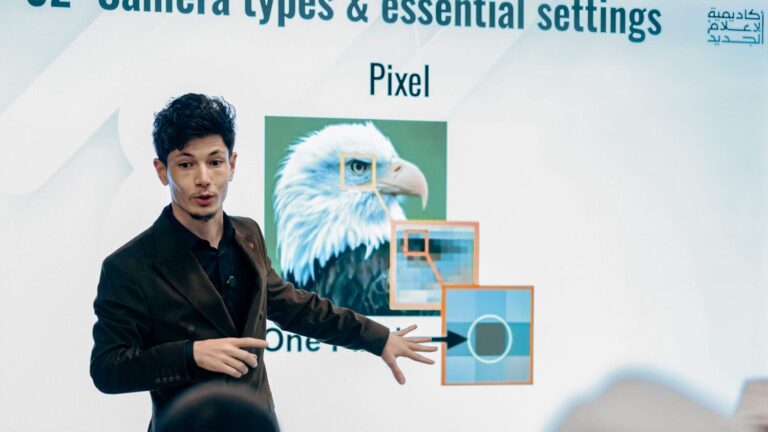Content creation is no longer a hobby—it’s a standalone economy
Ten years ago, saying “I’m a content creator” would draw polite smiles. It was considered a side hustle or a digital pastime.
Today? Major brands race to sign influencer partnerships, platforms allocate millions in funding to support creators, and governments are starting to regulate a new type of economy: the Content Economy.
Content creation is no longer just about posting videos or photos. It’s now a real source of income, a standalone career, and a meeting point between media, advertising, and education.
More importantly—in the Arab world, the numbers are starting to shift.
Global Growth of the Digital Content Industry – By the Numbers
To understand the scale of this market, let’s start with the global picture:
- In 2023, the global content creator economy was valued at $250 billion
- It’s expected to surpass $480 billion by 2027
- Over 200 million people around the world identify themselves as content creators
- Brand spending on content is increasing by 20%+ annually
These numbers point to one fact: content is now an economic asset, and creators are valuable digital entities with market worth.
The Creative Economy in the Arab World: Numbers & Trends
The Arab region is moving fast.
While some numbers remain vague due to lack of transparency, the trends are strong:
- Saudi Arabia has invested over 1.1 billion SAR in digital content through the General Commission for Audiovisual Media.
- The UAE launched initiatives like the “New Media Academy” and “Digital Content Creator Program” to build professional support ecosystems.
- A study by Choueiri Group found that 50–65% of Arab youth trust influencer content more than traditional ads.
- Egypt and Morocco are witnessing rapid growth in YouTube channels and Arabic educational and entertainment content.
This tells us something important: Arab audiences are not just consumers—they are participants, creators, and leaders.
Economic Challenges Facing Creators in the Arab World
Despite the growth, creators in the region face clear challenges:
- Lack of legal and regulatory frameworks
Many countries don’t yet have proper protections for creators against fraud or contract violations. - Limited access to funding and specialized training
Most support programs target institutions, not independent creators. - Disconnect between advertisers and creators
Some brands still see creators as mere advertising tools, missing the real value of strategic partnerships. - Lack of professional training in marketing, analytics, and financial planning
Many creators start with passion—but don’t know how to turn it into a sustainable business.
Growth Opportunities: How Can Creators Build Sustainable Careers?
The good news? Content creation can grow gradually and with low startup costs. Here are some key expansion opportunities:
- Launching digital products linked to content (ebooks, courses, tools, services)
- Building a licensable personal brand that can expand into other sectors (fashion, food, education)
- Offering training and consulting (especially in niches like beauty, tech, or education)
- Turning a digital presence into a media platform (podcast, channel, membership site)
Personally, I’ve helped Arab creators diversify their income and build additional revenue streams—making them less dependent on traditional advertising.
The Role of Companies and Governments in Enabling This Sector
Even the most talented creator can lose momentum without a supportive ecosystem.
That’s why this industry needs:
- Regulatory bodies that protect rights and establish clear standards
- Private companies that invest in partnerships—not exploitation
- Training entities that offer business, marketing, and financial skills to creators
- Media outlets that support Arabic content and amplify its reach through translation, distribution, and sponsorship
The creator is no longer just a “free marketing asset”—they’re a strategic partner in the digital economy.
My Personal Experience with the Creative Economy in the Arab World
Over the past few years, I’ve worked closely with content creators in Syria and Dubai.
I’ve seen how a single creator can go from zero to building a sustainable income—entirely through their content.
I collaborated with one of the region’s leading platforms and helped design campaigns where the creator was the core—not a side element.
Today, I see this economy taking shape:
- A creator becomes a company
- A podcast becomes a product
- A simple video opens doors to regional partnerships
Final Thoughts: A New Career or a Leading Force in Tomorrow’s Economy?
The answer? Both.
Content creation is no longer a niche. It’s a soft power, a parallel economy, and a fully-fledged career path.
Those waiting for “the trend to pass” will miss the real shift that’s happening.
What do we need now?
- To recognize the professional value of content creators—not treat them as amateurs
- To build tools, support, and legal frameworks that empower them
- To understand that the future isn’t made in factories alone—but also on camera, behind the mic, or through a smartphone screen
The coming economy has a big role for content creators. The question is: are you ready to be part of it?



